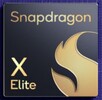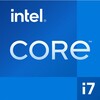Qualcomm Snapdragon X Elite X1E-78-100 vs Intel Core i7-1260U
Qualcomm Snapdragon X Elite X1E-78-100
► remove from comparison
The Snapdragon X Elite X1E-78-100 is a pretty fast ARM architecture processor (SoC) for use in Windows laptops. The X1E-78-100 is the least powerful member of the Snapdragon X Elite processor series, as of May 2024; as such, it has 12 Oryon CPU cores (3 clusters of equally powerful cores; 12 threads) running at no more than 3.4 GHz. Other key features include the 3.8 TFLOPS Adreno X1-85 iGPU, the 45 TOPS Hexagon NPU and an impressively fast LPDDR5x-8448 memory controller.
The top dog, known as the Snapdragon X Elite X1E-84-100, is thought to be based on the same die with the same NPU but with higher GPU clock speeds, higher CPU clock speeds and possibly higher power targets as well.
Architecture and Features
Qualcomm Oryon cores are in part based on Nuvia IP; they most likely make use of the ARM v8.7 microarchitecture. Much like modern AMD and Intel processors, the Snapdragon chip is compatible with USB 4 and thus with Thunderbolt 4 but it remains to be seen if the X Elite is compatible with GeForce or Radeon discrete graphics cards.
The SoC is said to have 12 PCIe 4 and 4 PCIe 3 lanes for connecting various kinds of devices. NVMe SSDs are supported with a throughput of up to 7.9 GB/s; furthermore, most laptops built around the chip are expected to have 16 GB of LPDDR5X-8448 RAM. There is also a 45 TOPS NPU for accelerating AI workloads.
Performance
Our first benchmarks (featuring a 35 W X Elite X1E-78-100) revealed very decent CPU performance figures that see the X Elite going head-to-head with the AMD Ryzen 7 7840U. It's also not much faster or slower than the Apple M3 chip with 10 GPU cores. While not groundbreaking, this should be good enough for the user to be able to run any applications in 2024 and 2025.
Like any other Windows on ARM platform, the Snapdragon X chip works best with applications and games compiled specifically for ARM processors. If making use of the built-in x86 to ARM emulation mode, a performance penalty of about 20% is to be expected.
Graphics
The integrated 3.8 TFLOPS Adreno X1-85 GPU is DirectX 12-enabled but not DirectX 12 Ultimate-enabled, despite featuring VRS and ray tracing support. The 3.8 TFLOPS of performance that it supposedly delivers pale in comparison to the slowest current-generation professional Nvidia Ada graphics card for laptops, the RTX 500 Ada, that's good for up to 9.2 TFLOPS.
Its gaming performance is rather underwhelming according to our in-house testing results. While slightly faster than the aging Iris Xe (96 EUs), the Adreno fails to outgun the Radeon 780M meaning there is little point in comparing it with full-fat discrete graphics cards. Baldur's Gate 3, a triple-A title released in 2023, is pretty much unplayable at 1080p / Low. GTA V, a game that saw the light of day in 2015, is playable at 1080p / High.
The Qualcomm iGPU will let you use up to 3 UHD 2160p monitors simultaneously. 2160p120 integrated displays are supported, as are the popular AV1, HEVC and AVC video codecs (both decoding and encoding). The hardware does not support the VVC codec; that feature remains a Lunar Lake exclusive for now.
Power consumption
The X1E-78-100 is set to be slightly less power-hungry than its more powerful brothers. Expect to see anything between 20 W and 45 W under long-term workloads depending on the system and on the performance profile chosen. That's exactly what Ryzen HS chips normally consume.
The SoC is built with a 4 nm TSMC process for decent, as of H1 2024, energy efficiency.
Intel Core i7-1260U
► remove from comparison
The Intel Core i7-1260U is a mobile CPU for thin and light laptops based on the Alder Lake architecture. It was announced in early 2022 and offers 2 performance cores (P-cores, Golden Cove architecture) and 8 efficient cores (E-cores, Gracemont architecture). The P-cores support Hyper-Threading leading to 12 supported threads when combined with the E-cores. The clock rate ranges from 1.1 to 4.7 GHz on the performance cluster and 0.8 to 3.5 GHz on the efficient cluster. The performance of the E-cores should be similar to old Skylake cores (compare to the Core i7-6700HQ). All cores can use up to 12 MB L3 cache. The 1260U offers "Enterprise" vPro management features. Compared to the P-series (28W) or H-series (45W), or even the 15W U-series, the 9W TDP will limit the sustained performance.
Performance
Compared to the old 7 Watt Comet Lake-Y series (like the i7-10510Y), the performance should be clearly better thanks to the 10 cores and the improved architecture of the P-cores. Compared to the 15 W U-series (like the similar specified Core i7-1265U) the sustained performance will be clearly limited by the 9 Watt TDP. As always, the performance will also greatly depend on the cooling solution, especially for fanless laptops and tablets.
Features
The integrated memory controller supports various memory types up to DDR5-4800, DDR4-3200, LPDDR5-5200, and LPDDR4x-4267. The Thread Director (in hardware) can support the operating system to decide which thread to use on the performance or efficient cores for the best performance. For AI tasks, the CPU also integrates GNA 3.0 and DL Boost (via AVX2). Quick Sync in version 8 is the same as in the Rocket Lake CPUs and supports MPEG-2, AVC, VC-1 decode, JPEG, VP8 decode, VP9, HEVC, and AV1 decode in hardware. The CPU only supports PCIe 4.0 (x8 for a GPU and two x4 for SSDs).
The integrated graphics card is based on the Xe-architecture and offers all 96 EUs (Execution Units) operating at up to 0.95 GHz.
Power consumption
This 12th gen Core i7 processor has a Base power consumption of 9 W, with 29 W being its maximum Intel-recommended Turbo power consumption. It is built with Intel's 2nd gen 10 nm process marketed as Intel 7 for decent energy efficiency.
| Model | Qualcomm Snapdragon X Elite X1E-78-100 | Intel Core i7-1260U | ||||||||||||||||||||||||||||||||||||||||||||||||||||||||||||||||||||||||||||
| Series | Qualcomm Snapdragon X | Intel Alder Lake-M | ||||||||||||||||||||||||||||||||||||||||||||||||||||||||||||||||||||||||||||
| Codename | Oryon | Alder Lake-U | ||||||||||||||||||||||||||||||||||||||||||||||||||||||||||||||||||||||||||||
| Series: Alder Lake-M Alder Lake-U |
|
| ||||||||||||||||||||||||||||||||||||||||||||||||||||||||||||||||||||||||||||
| Clock | <=3400 MHz | 800 - 4700 MHz | ||||||||||||||||||||||||||||||||||||||||||||||||||||||||||||||||||||||||||||
| Cores / Threads | 12 / 12 8 x 3.4 GHz 4 x 3.4 GHz Qualcomm Oryon | 10 / 12 | ||||||||||||||||||||||||||||||||||||||||||||||||||||||||||||||||||||||||||||
| TDP | 35 Watt | 9 Watt | ||||||||||||||||||||||||||||||||||||||||||||||||||||||||||||||||||||||||||||
| TDP Turbo PL2 | 45 Watt | |||||||||||||||||||||||||||||||||||||||||||||||||||||||||||||||||||||||||||||
| Technology | 4 nm | 10 nm | ||||||||||||||||||||||||||||||||||||||||||||||||||||||||||||||||||||||||||||
| iGPU | Qualcomm Snapdragon X Adreno X1-85 (3.8 TFLOPS) | Intel Iris Xe Graphics G7 96EUs ( - 950 MHz) | ||||||||||||||||||||||||||||||||||||||||||||||||||||||||||||||||||||||||||||
| Architecture | ARM | x86 | ||||||||||||||||||||||||||||||||||||||||||||||||||||||||||||||||||||||||||||
| Announced | ||||||||||||||||||||||||||||||||||||||||||||||||||||||||||||||||||||||||||||||
| Manufacturer | www.qualcomm.com | ark.intel.com | ||||||||||||||||||||||||||||||||||||||||||||||||||||||||||||||||||||||||||||
| L1 Cache | 928 KB | |||||||||||||||||||||||||||||||||||||||||||||||||||||||||||||||||||||||||||||
| L2 Cache | 9.5 MB | |||||||||||||||||||||||||||||||||||||||||||||||||||||||||||||||||||||||||||||
| L3 Cache | 12 MB | |||||||||||||||||||||||||||||||||||||||||||||||||||||||||||||||||||||||||||||
| max. Temp. | 100 °C | |||||||||||||||||||||||||||||||||||||||||||||||||||||||||||||||||||||||||||||
| Socket | BGA1781 | |||||||||||||||||||||||||||||||||||||||||||||||||||||||||||||||||||||||||||||
| Features | LPDDR4x-4266/LPDDR5-5200 RAM, PCIe 4, Thr. Director, DL B., GNA, vPro Ent., RPE, MMX, SSE, SSE2, SSE3, SSSE3, SSE4.1, SSE4.2, AVX, AVX2, BMI2, ABM, FMA, ADX, SMEP, SMAP, EIST, TM1, TM2, HT, Turbo, SST, AES-NI, RDRAND, RDSEED, SHA, TME |


 Deutsch
Deutsch English
English Español
Español Français
Français Italiano
Italiano Nederlands
Nederlands Polski
Polski Português
Português Русский
Русский Türkçe
Türkçe Svenska
Svenska Chinese
Chinese Magyar
Magyar